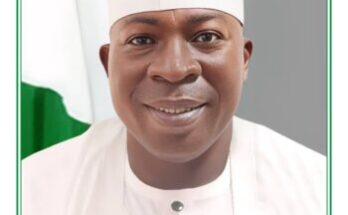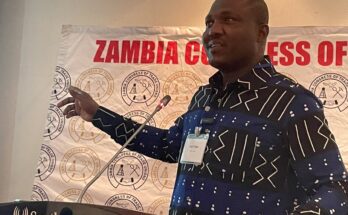Dr. Aminu Umar is the Head of Department Political Science, National Open University of Nigeria. In this interview with Musa Umar Bologi, he speaks on media reportage and how comments from politicians aid in fueling propaganda of the Boko Haram terrorists, which he said is impacting negatively on the ongoing fight against the terrorists in the North east.
Excerpts:
Nigerians and also the media are beginning to accept propaganda from Boko Haram terrorists, which has also to a large extent impacted negatively on psyche of troops fighting terrorism in North east Nigeria. Why do you think it is so and what can be done to correct it?
Let me begin by commending Nigerian troops in the ongoing fight against Boko Haram terrorists in the North east; they have done very well. The fight against the terrorists is not an easy battle unless one does not know the axis call the North east of Nigeria. The North east is a very large and vast land that anybody with a criminally minded motive can easily swing in-between and will be very difficult to trace. If you know how the environment is, you will understand that the best soldiers in the world will surely have difficulty in confronting an organised group like the Boko Haram.
But above all, the issue of propaganda that has dominated the media over time is because of the nature of Nigerian setting. Most Nigerians believe in what they see without digesting. This is responsible greatly to poor management of information; and I think part of the problems has to do with the nature of the community where the operation is taking place and the level of commitment of the community to the success of the operation.
The Nigerian Army has really been overstretched in the sense that it is not only fighting against Boko Haram terrorist, but also fighting a media battle. And this cannot be unconnected with the nature of politics in Nigeria. There are people who may what to damage the reputation of the army in the operation, and think that propaganda should be in the forefront in order to achieve their motive by discredit the role the army is playing in the theater of operation.
However, the army has a lot to do to address this issue of propaganda. It must develop some mechanism that will counter most of the negative narratives coming from the adversary. It must also market itself for people to appreciate what it is doing.
Like I said earlier the operation in the North east is not an easy one. It is not easy to fight a battle that you cannot easily trace the identity your adversary. When troops go to communities they cannot just launch assault on people. They have to study and understand who the Boko Haram members are. And whoever hide his gun and wear his regalia and come out clean, the troops cannot identify whether he is Boko Haram or not. This is how suicide bombings happen in major cities in the North east, like Maiduguri.
By and large, the army needs to do more by improving on its civil-military relations and engaging civil population in order to get very reliable intelligence reports. It also needs to play vital role in the social media space; because reporting has now become a common thing in Nigeria – with just a good mobile people can just type and post what they like, and before you know it the damage has been done. Therefore, there is the need for the army to boost its social media presence to counter whatever negative message that is coming out concerning their operations. This will enable people to appreciate what they have been doing.
You talked about the role played by politicians in the counter insurgency operations in the North east, as you argued that the whole thing is being politicized to the detriment of national security. Now that election is fast approaching, what do you tell Nigerian politicians and the media?
Like I said earlier, politicians are part and parcel of the problem. Prior to the primaries of political parties, the North east was relatively calm. But immediately after the primaries, especially of the two major political parties in the country, the invasions of military formations by Boko Haram terrorists continue unprecedented till the recent attacks in Metele, Baga, and others locations.
Like I said earlier, it is not an easy war; and it has not been easy for the army. Therefore there is the need for Nigerians to appreciate the efforts of the military to tackle the menace in the North east.
On the way the media operates, I think one of the challenges is the enabling legislation for media practice in Nigeria. There is also no any form of sanction for wrong doing by media organisations, especially as the constitution provides free speech.
Apart from the electronic media that, to some extent, is being regulated by the National Broadcasting Commission (NBC); the print and others are just an offshoot of an individual who may have the capacity and resources to operate.
What guides media operation in Nigeria is the Code of Ethic, which itself is not solely legally binding on media reportage. So the way the media is left to operate and the way the social media has become a tool in the hands of everybody in the country has made media reports less credible. As you are aware the level of literacy, especially in the North east and even across the country, is low.
Therefore whatever that is being reported most people do not have the capacity to digest whether it is the truth or not; and this has greatly contributed to the problem against the fight against Boko Haram.
In view of this, the army has to map out mechanism for its propaganda so that people can understand and believe what it is doing. This will also go a long way to boosting the morale of the troops in the theater of operation.
What do you think can be done to avoid reportage that could jeopardize national security, as well as ongoing operations?
I think the leadership of various media organisations must play a critical role in this respect in the sense that they don’t have wait for the government to complain. Where reports are realised not to be objective, the leadership of the media can sanction the reporter or media organisation.
Part of the problem is that many media proprietors have inclination toward certain political group. They also feel happy when their media houses report things that are negative against those that do not share the same ideology with them. Unfortunately, media organisations that are objective in their reportage do not have high patronage or reach that will enable them spread information about the reality in the theater of operation.
The leadership of the media must come together and realise that this is a profession that must be protected, and they musts from time to time sanction organisations that try to sell an agenda that will distabilise national security. Media owners, especially the private owned, should also take into cognizance the welfare of their reporters to avoid falling to temptation of being used for negative propaganda against the state.
I suggest that there should be legislation that mandates anybody that wants to set up a media house should have a salary of like 10 to 15 years. Probably this may lead to further constitutional amendment, or an act of parliament to curtail certain excesses of people who negatively report about happenings about things that could breach security and destroy the country.



